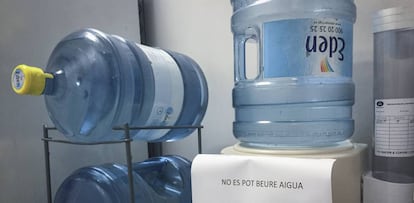“Human fecal contamination” at origin of bottled water health scare
Catalan authorities say gastroenteritis virus must have tainted water at bottling plant in nearby Andorra


The bout of gastroenteritis that left more than 4,000 people sick after they drank bottled water was caused by “human fecal contamination,” according to Catalan health authorities.
The norovirus that health officials found in patient samples also showed up in water that had been drawn from Arinsa Spring, in the nearby principality of Andorra.
But the Catalan Public Health Agency (ASPCAT) said it was unlikely that the spring water itself was contaminated, and pointed at the bottling plant Aïgues de Andorra as the likely source of the problem.
All it takes is a few dozen units of the norovirus to cause an infection; up to 10,000 particles per liter of two kinds of noroviruses were detected in the suspect water
Albert Bosch, the researcher who analyzed the samples, said that “it is hard to imagine that there could be fecal waters near the spring.”
The Catalan health chief, Joan Guix, said that the only repository for this type of norovirus is the human body, and that the origin of the health scare must have been caused by “human fecal contamination.”
Investigators are now trying to determine how the transmission took place, and awaiting a report from Andorran authorities, who have halted all production lines at the bottling plant until the matter is resolved.
Sign up for our newsletter
EL PAÍS English Edition is launching a weekly newsletter. Sign up today to receive a selection of our best stories in your inbox every Saturday morning. For full details about how to subscribe, click here.
This is the first time in recorded history that a virus has been found inside bottled water, said Catalan health authorities.
All it takes is a few dozen units of the norovirus to cause an infection; up to 10,000 particles per liter of two kinds of noroviruses were detected in the suspect water. They were the same kind found in the patient samples.
“We found positive samples in feces and in water, which proves that there is a cause-effect relation,” said Guix.
The health chief added that Eden, the company in charge of distributing the water in Catalonia, has been inspected and that no anomalies were found.
Guix said that the contamination must have occurred “at the origin, during the process of obtaining or bottling the water, or in the bottle hygienization.”
Catalan authorities are not planning any sanctions against Eden, given that the inspection turned up no problems at their facilities. Guix did not rule out the possibility of legal action by individual patients, however.
The bout of gastroenteritis has been officially declared over after making 4,136 people sick in Barcelona and Tarragona. The water was distributed to hundreds of companies with water dispensers used by employees.
Although symptoms were mild (vomiting, nausea, diarrhea and abdominal pain), six people were hospitalized and discharged 24 hours later. No new cases have emerged since last weekend.
English version by Susana Urra.
Tu suscripción se está usando en otro dispositivo
¿Quieres añadir otro usuario a tu suscripción?
Si continúas leyendo en este dispositivo, no se podrá leer en el otro.
FlechaTu suscripción se está usando en otro dispositivo y solo puedes acceder a EL PAÍS desde un dispositivo a la vez.
Si quieres compartir tu cuenta, cambia tu suscripción a la modalidad Premium, así podrás añadir otro usuario. Cada uno accederá con su propia cuenta de email, lo que os permitirá personalizar vuestra experiencia en EL PAÍS.
¿Tienes una suscripción de empresa? Accede aquí para contratar más cuentas.
En el caso de no saber quién está usando tu cuenta, te recomendamos cambiar tu contraseña aquí.
Si decides continuar compartiendo tu cuenta, este mensaje se mostrará en tu dispositivo y en el de la otra persona que está usando tu cuenta de forma indefinida, afectando a tu experiencia de lectura. Puedes consultar aquí los términos y condiciones de la suscripción digital.








































